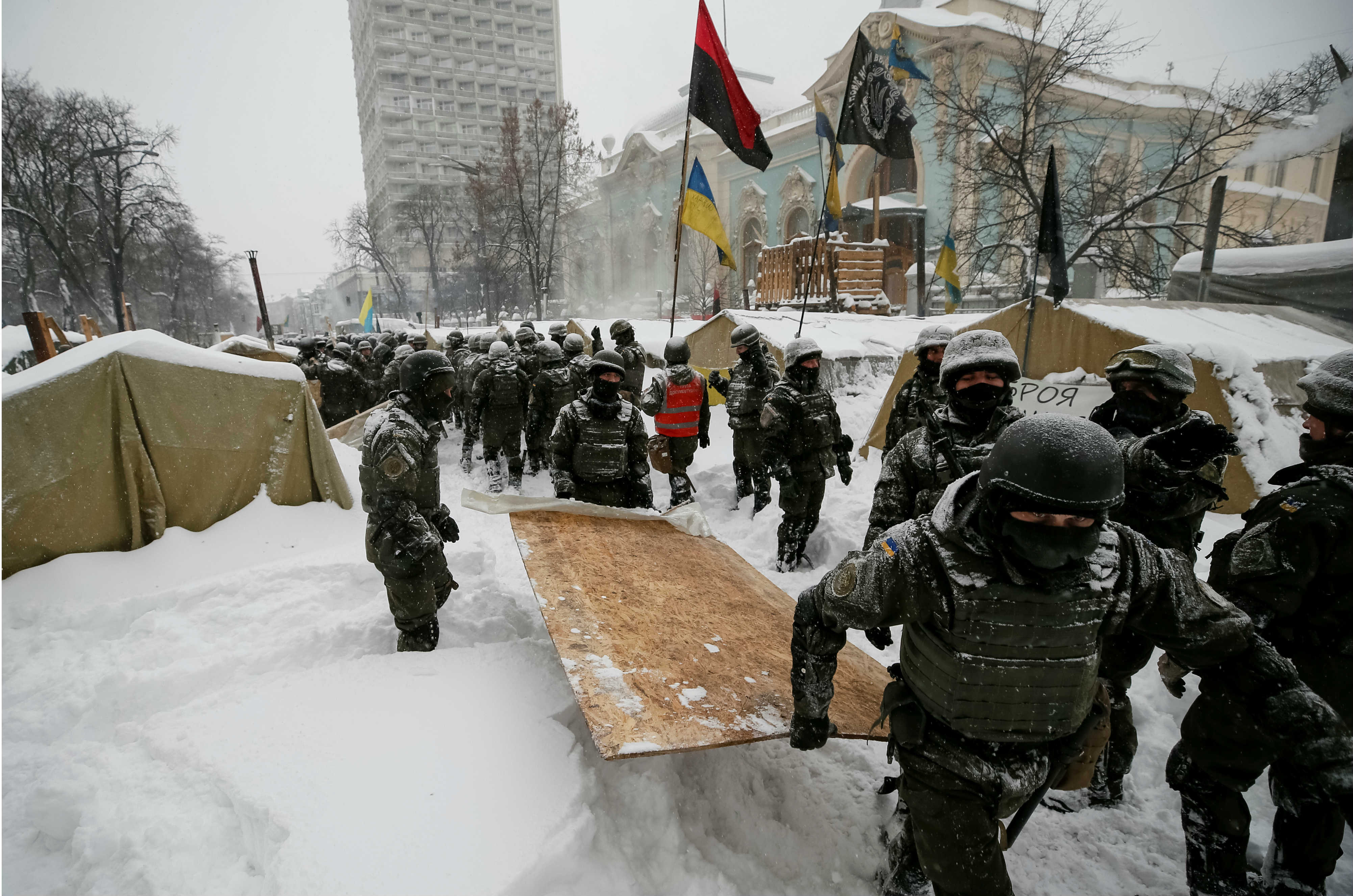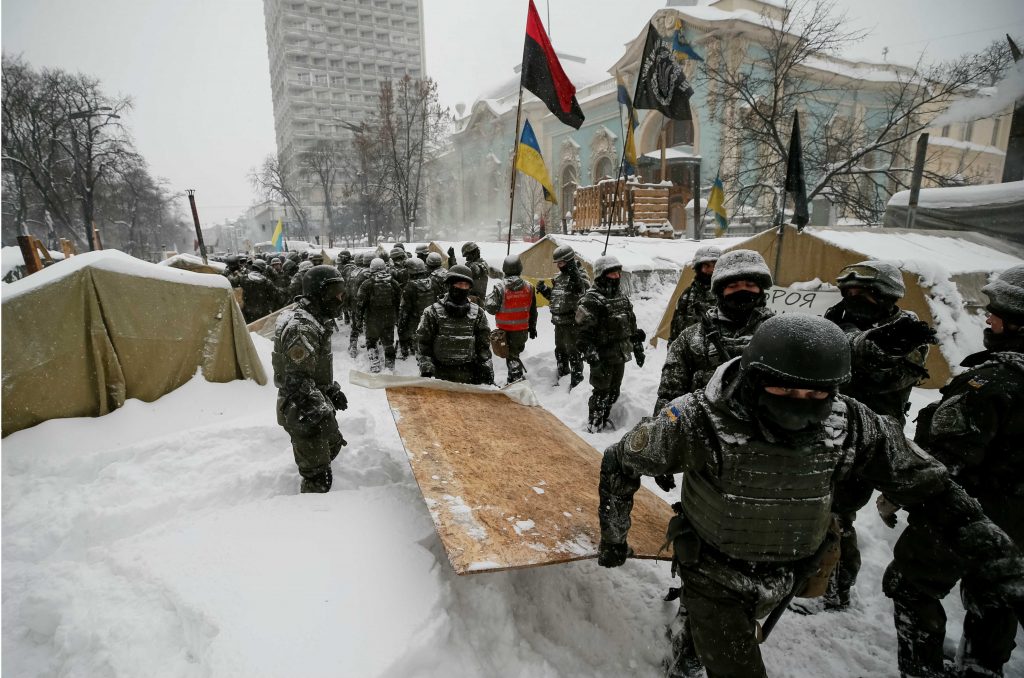 On Sunday, March 3, Ukraine’s police dispersed more than one hundred protesters and disbanded their tent camps outside of the Ukrainian parliament amid significant criticism. Several dozen tents had stood for more than four months, blocking a major thoroughfare in Kyiv, Ukraine. Behind the protests were former opposition leader Mikheil Saakashvili and former soldiers who had been demanding that President Petro Poroshenko resign. Semen Semenchenko and Yegor Soboliev, two deputies from the Lviv-based Samopomich party, had been involved in the protest movement as well, although the party never sanctioned their actions.
On Sunday, March 3, Ukraine’s police dispersed more than one hundred protesters and disbanded their tent camps outside of the Ukrainian parliament amid significant criticism. Several dozen tents had stood for more than four months, blocking a major thoroughfare in Kyiv, Ukraine. Behind the protests were former opposition leader Mikheil Saakashvili and former soldiers who had been demanding that President Petro Poroshenko resign. Semen Semenchenko and Yegor Soboliev, two deputies from the Lviv-based Samopomich party, had been involved in the protest movement as well, although the party never sanctioned their actions.
When police finally broke up the tent camps, they reportedly found nine grenades, Molotov cocktails, and five smoke bombs.
At least twenty people were injured in the skirmish, including two journalists. Yet everyone who is now bewailing the end of this latest “Maidan” and comparing the actions of the police to the thuggish ways of former President Viktor Yanukovych, the “Berkut” riot police unit, and the real Maidan are besmirching the events of four years ago when Ukrainians rose up and overthrew a real dictator.
Let’s analyze this step by step. Yes, people have the right to protest. This means that they are free to express their disapproval of the authorities, and to make it known in different ways. Were we free to protest during Yanukovych’s time? Just recall how turning his portrait upside down could result in up to four years in jail. Has this slipped everyone’s mind? Under Yanukovych one really couldn’t do anything. The State Security Service abducted activists, the “Berkut” police unceremoniously rounded people up and blocked access to the government quarter, and the media kept mum. Everyone was afraid to make a peep. How easily so many have forgotten.
Is anyone now forbidding people from criticizing the authorities? In fact, I think the criticism has turned into a downpour. Everywhere one turns there is criticism. With the possible exception of EU Ambassador Hugues Mingarelli, absolutely no one is talking about positive things. One can carry portraits turned whichever way one likes, one can post stickers, one can badmouth Poroshenko or Interior Minister Arsen Avakov, one can hold marches, and one can make effigies. But there are no grounds for violent forms of protest. The 2013-14 Euromaidan was the result of protest having become impossible.
This was also the reason why the Maidan turned violent. Were there weapons on the Maidan? Yes. But they appeared after the authorities began killing activists. In contrast, the recent gaggle of protesters in front of the parliament was armed with grenades. And they had been discussing violent methods to replace those in power to achieve their goals. By any definition, they are extremists. Throughout the democratic world, extremists are forcefully rounded up by riot police. And such action does not violate democratic principles because the right to protest is a guaranteed and protected right, while there is no right to sit armed with grenades and demand that someone step down.
No one loves cops, and I’m no exception. Ukraine’s police unfortunately haven’t changed much and they responded with too much force. Yes, many former members of the “Berkut” unit are still employed. The reality is that police jobs are rarely filled with people from the intelligentsia. Because police work means dealing with filth, blood, drugs, murders, down-and-outs, terrorists, etcetera, it falls to ex-soldiers, tough young men from rural areas, and regular guys from meager circumstances to get the job done. This is the reality, and it’s not confined to Ukraine. This situation can be improved only by stronger civic control over the police.
At the same time, it falls to those same police to enforce the state order. If they can’t deal with fifty provocateurs who are so impatient they can’t wait a year until elections come around, how long will it take until we have parades of the Kharkiv People’s Republic, Mykolayiv People’s Republic, Zaporizhzhya People’s Republic, or the Odesa People’s Republic? It’s ironic but those who mourn the dispersal of the armed radicals are the same people who are insisting there should have been a harsher crackdown on the separatists in Luhansk and Donetsk back in the spring of 2014.
If Ukraine’s police are unable to enforce order under conditions when there is freedom to protest and freedom of speech, it will take only weeks for Ukraine to become a failed state. Raiders, goons, separatists, and regional barons will quickly take over, shielded as “holy protesters.” Then the majority of the Facebook crowd will have something different to weep over.
Victor Andrusiv is the executive director of the Ukrainian Institute for the Future. From 2010 to 2014, he was a member of the anti-Yanukovych movement and the deputy head of Democratic Alliance.
Image: Servicemen of the National Guard remove a protesters tent camp near the parliament building in Kyiv, Ukraine March 3, 2018. REUTERS/Gleb Garanich
